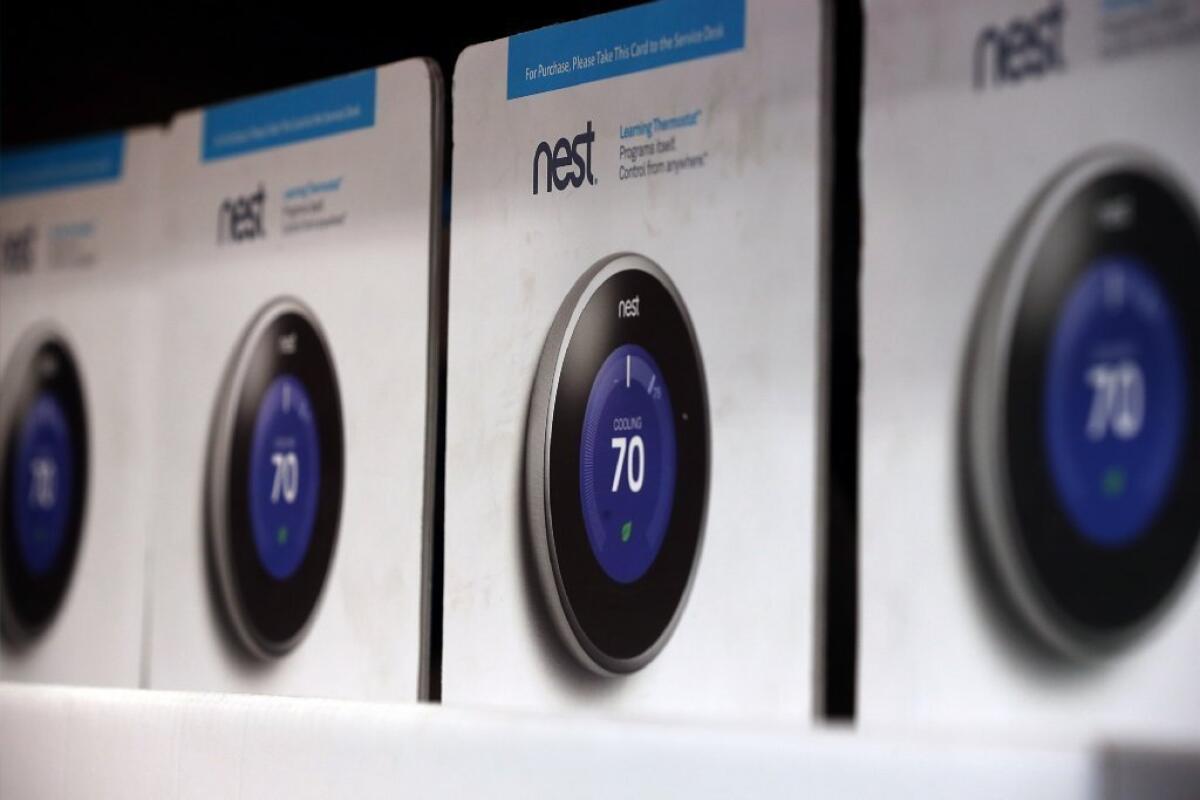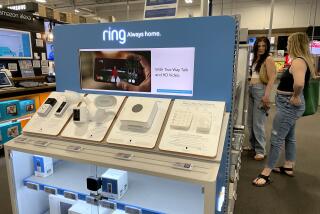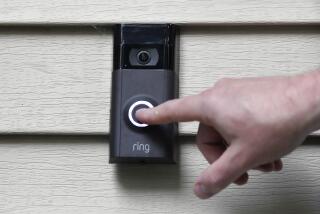Homebuilders ditch Nest after Google ties devices to its digital assistant

- Share via
Several residential builders have stopped buying and installing Google’s Nest devices after the internet giant overhauled how Nest technology works with other gadgets.
The Alphabet Inc. unit bought Nest in 2014 for $3.2 billion to enter the smart-home market. Nest has become one of the largest makers of internet-connected thermostats, smoke alarms and locks.
The devices were popular with builders who saw a Nest gadget as a way to increase the value of properties. But this year, that began to change as Google exerted more control over Nest and started changing the underlying technology.
As a more independent business, Nest developed software that helped its gadgets communicate with a wide range of products from other manufacturers, through accounts set up directly by users.
As of the end of August this year, however, consumers need a Google account — and access to the company’s voice-based Google Assistant service — to integrate new Nest products with other devices in their homes.
The move may help the internet giant weave its Google Assistant deeper into people’s lives. But for builders it’s just a pain because Nest devices no longer work so well with the other gadgets they install in homes, such as audio and entertainment systems, as well as alarms and other security gear. It’s also a less enticing user proposition with all the privacy permissions that Google Assistant requires.
That has led some builders — who collectively purchase tens of thousands of Nest devices each year — to avoid Nest products.
“We’ve stopped,” said Mark Zikra, vice president of technology at CA Ventures, which builds and operates apartments, senior homes and other property. “In an apartment complex we’re talking about 200, 300 devices that would be installed in one swoop and then all of a sudden everyone moves in. We don’t have the luxury of being able to say, ‘Hey, are you a Google person or are you a Honeywell person?’”
Similar sentiments were shared by others in the construction industry, including two large systems-integration firms that work with hundreds of builders across the United States.
For Sean Weiner, chief technology officer of Bravas Group, the main sticking point is Google’s decision to tie its digital assistant to Nest products. Bravas installs smart-home devices and audio systems in about 3,500 high-end homes a year, and the ability to connect to as many different gadgets as possible is the most important feature. Digital assistants can’t handle these larger, more complex systems, according to Weiner.
“If we put that control in the hands of Google, we’ve lost that control,” he said.
This could dent Nest sales at a time when Google is trying to generate more revenue from consumer hardware. Commercial installers and builders are an important source of smart-home sales, and Nest had developed a program to train professionals how to hook up its gadgets.
Google has said it is being more selective with outside partners to increase security and privacy. At an event this month in New York City, the company highlighted how its home devices and smartphones work together to provide functionality that consumers can’t get unless they go all-in with Google technology. Still, the company is working to increase the number of other devices Nest products work with.
That’s little comfort for builders in the middle of existing projects, such as David Berman, who has been installing electronics in homes since the 1960s. Now, his company sets up networks of smart-home devices in thousands of homes a year. When Google said this year that Nest’s integration technology was changing, he stopped using Nest devices.
“We were more or less forced into the switch,” he said. “When people buy a connected device, they expect it to connect. That’s not something that happens with Nest anymore.”
Google isn’t alone in trying to tie its devices to a digital assistant. Amazon.com Inc. and Apple Inc. have pursued similar goals, and the smart-home market increasingly revolves around the tech giants, with manufacturers of light bulbs, thermostats, smoke alarms and more struggling to make their wares compatible with all three.
Even though Nest has been owned by Google for five years, it hadn’t been fully pulled into the internet giant’s orbit until now.
When Google announced the acquisition in 2014, Nest said it would share user data only with its own products and services, not Google’s. In a blog post, Nest co-founder Matt Rogers said that “Nest data will stay with Nest” and that the company wasn’t changing its terms of service.
It didn’t take long for that to change. And Rogers’ blog post is no longer available on Nest’s website. Less than six months after the deal, Nest said Google would connect some of its apps, letting Google know whether Nest users were at home. The integration enabled those people to set the temperature of their homes with voice commands and helped Google’s digital assistant set the temperature automatically when it detected the people were returning home.
Initially, smart-home products connected to “home hubs” that acted as a gateway linking many devices — even if they used different communication standards and protocols. “That idea has mostly died” as tech giants take over that central role with their voice assistants and smart speakers, said Frank Gillett, an analyst at Forrester Research.
“This is a symptom of a larger challenge in the smart-home arena,” he added.
Interoperability doesn’t need to be compromised for security and privacy, said Aaron Emigh, chief executive of Brilliant Home Technology Inc., which makes a centralized hub that hosts Amazon’s Alexa voice assistant.
Amazon put Brilliant through many tests, on topics including audio quality and the ability to stop hacks. The same hasn’t happened with Google, he said. Google devices, such as its Home smart speakers, can be used to control Brilliant’s hub with your voice, but the integration is incomplete compared with Alexa, Emigh added.
“What they’re doing is creating a lot of mistrust around Google, and that’s then causing people to deselect Google and Nest as technology platforms,” Emigh said. “That’s happening in droves.”
De Vynck writes for Bloomberg.






